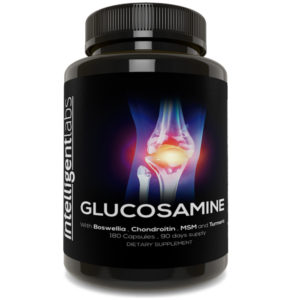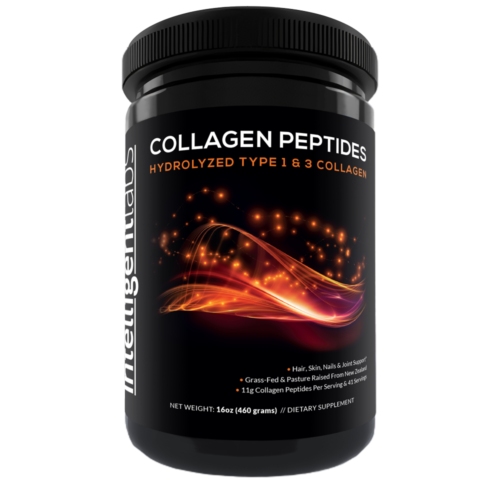If there’s only one supplement you should take for joint health, what would it be? Would it be Glucosamine – a well-known joint supplement? Or would you rather take Collagen – a supplement known for its skin, hair, and nail benefits? Stay with us as we tackle the similarities and differences of taking glucosamine vs collagen for joint health!
Table of Contents
Joint health supplement option #1: GLUCOSAMINE
Let’s get to know our first joint health supplement contender in our glucosamine vs collagen comparison:
What is glucosamine?
Glucosamine is an amino sugar that’s naturally found in the human body. It’s a precursor for glycosaminoglycans, a major component of cartilage.

Cartilage is a connective tissue that cushions and protects the joints. It acts like a shock absorber and protects the joints from getting worn down.
However, glucosamine levels go down as we grow older, which explains why joint pains and other body aches start appearing with age.
The good news is that studies show that glucosamine may help the body produce more glycosaminoglycans and maintain cartilage health in the process. This may then help alleviate joint pain and improve joint health, such as in osteoarthritis (OA) patients.
Most supplements come in the widely-researched glucosamine sulfate form, including our Intelligent Labs Glucosamine Complex supplement. The other forms are glucosamine hydrochloride and N-acetyl glucosamine.
What do studies say about glucosamine’s effects on joint pain?
Many studies point to the effectiveness of glucosamine in treating joint pain.
To begin with, one study explains that glucosamine is a powerful anti-inflammatory that can help reduce inflammation in joints. It also has antioxidant properties that help negate free radical damage and improve redox status (this is the balance between oxidants and antioxidants). Moreover, glucosamine activates autophagy in joints, the body’s natural cleaning process that breaks down and reuses damaged cell parts (1).
Another study, this time a systematic review of 18 studies published between 2003 and 2016, showed that glucosamine sulfate helped with knee osteoarthritis symptoms and pain management. The results were favorable enough for the researchers to suggest that clinicians should consider using glucosamine to treat their OA patients (2).
The same review also noted that 6 out of the 18 studies they looked at used a glucosamine + chondroitin combo. They pointed out that this combo had a more positive effect on joint pain than glucosamine alone (2).
We mention this combo here because our Glucosamine Complex contains both compounds. Each serving contains 1500mg of glucosamine sulfate and 150mg of chondroitin sulfate, along with 6 other natural ingredients known for their joint health benefits!
Where is glucosamine sourced from?
From shellfish, such as shrimps, prawns, and crabs. Their protective exoskeletons are rich in chitin, a tough and inelastic polysaccharide. Glucosamine is obtained from chitin through hydrolysis.
Plant-based glucosamine is also available for vegans. These are made from corn and the fungus Aspergillus niger.
Are there any side effects?
Side effects reported in studies are rare and minor. They may include diarrhea, constipation, drowsiness, headache, nausea, heartburn, and skin reactions (3).
Who shouldn’t take glucosamine?
Anyone allergic to shellfish should refrain from taking glucosamine.
Also, anyone with glaucoma should not take glucosamine. A clinical trial reported that glucosamine sulfate could increase intraocular pressure, i.e. fluid pressure inside the eye (4).

Joint health supplement option #2: COLLAGEN
Let’s get to know our second joint health supplement contender in our glucosamine vs collagen comparison:
What is collagen?
Collagen is the most abundant protein in the body. It’s considered the “glue” that holds our different parts together.

And similar to glucosamine, collagen production also declines with age, beginning in the early 20s. This is when fine lines and wrinkles start appearing on our skin.
There are several collagen types, with types I, II, and III being the most common and making up about 80-90% of total collagen in the body (5).
The marketing for collagen products usually places a heavy emphasis on its skin-deep benefits, i.e. skin rejuvenation and youthful appearance. But its effects aren’t limited to the skin. Collagen, especially types I and III, are present in the skin, bones, tendons, ligaments, organs, blood vessels, scar tissue, muscles, and the cornea.
When choosing the right collagen product, make sure they come in peptide or hydrolyzed form. The body absorbs them far better than full-length or native collagen molecules. This means that the body can use the collagen more efficiently.
What do studies say about collagen’s effects on joint pain?
Here are some studies that highlight collagen’s joint health benefits.
A literature review confirms that collagen reduced pain in OA patients as well as those suffering from other forms of arthritis. Collagen’s absorption in the intestine and accumulation in the cartilage may contribute to its effects on joint health (6).
A more recent meta-analysis also showed the same result as the literature review above. Researchers concluded that collagen may help improve stiffness associated with OA. Pain levels also went down after taking collagen (7).
Even athletes who suffered from activity-related joint pain had positive experiences with collagen supplementation. After 24 weeks of daily 10g collagen intake, they reported that collagen helped ease their joint pain while resting and while doing various activities, such as walking, lifting, and carrying objects (8).
Another study on young adults aged 18-30 had a similar outcome to the athlete study above. The subjects had no joint disease but had knee pain from exercise. They took 5g of collagen daily for 12 weeks. After the experiment, the researchers concluded that collagen can significantly reduce activity-related joint pain in young adults (9).
Lastly, a systematic literature review reported that collagen peptides may have a positive effect on both osteoporosis and osteoarthritis. It may help improve symptoms by improving bone mineral density, protecting articular cartilage in joints, and alleviating pain (10).
Where is collagen sourced from?
The connective tissues of animals like cows, pigs, and fish are rich in collagen. For our Intelligent Labs Collagen Peptides powder, we use types I and III collagen sourced from grass-fed and non-GMO cows in New Zealand.
Unfortunately, there are no true vegan options for collagen. However, there are some products that use human-like collagen obtained from genetically modified microbes (11).
Are there any side effects?
Collagen is safe to take even long term. Reports of side effects are rare, but may include feelings of bloat and heartburn.
Who shouldn’t take collagen?
Anyone who is allergic to any of the ingredients used in a collagen product shouldn’t take collagen.
Conclusion: Glucosamine vs collagen for joint health – which one’s better?
The answer will depend on your use case, really. Both joint supplements do have the science to back up their health benefits.
So, who should take glucosamine?
Anyone who needs faster joint pain relief may benefit from taking our Glucosamine Complex. This product may help reduce pain, rebuild joints, and increase movement.
And who should take collagen?
Anyone who wants to reap our Collagen Peptide‘s more well-rounded health benefits may take it. Collagen’s effects aren’t limited to joint health. You may also see improvements in your skin, hair, nails, eyes, teeth and gums, muscles, and more.
For best results, do speak with your doctor before taking either supplement, especially if you’re already experiencing joint pain. Dietary supplements may help, but it may be some time before you see any effects (the studies above lasted several weeks).
Note: At this time, our Collagen Peptides powder is only available for sale in the USA market.

